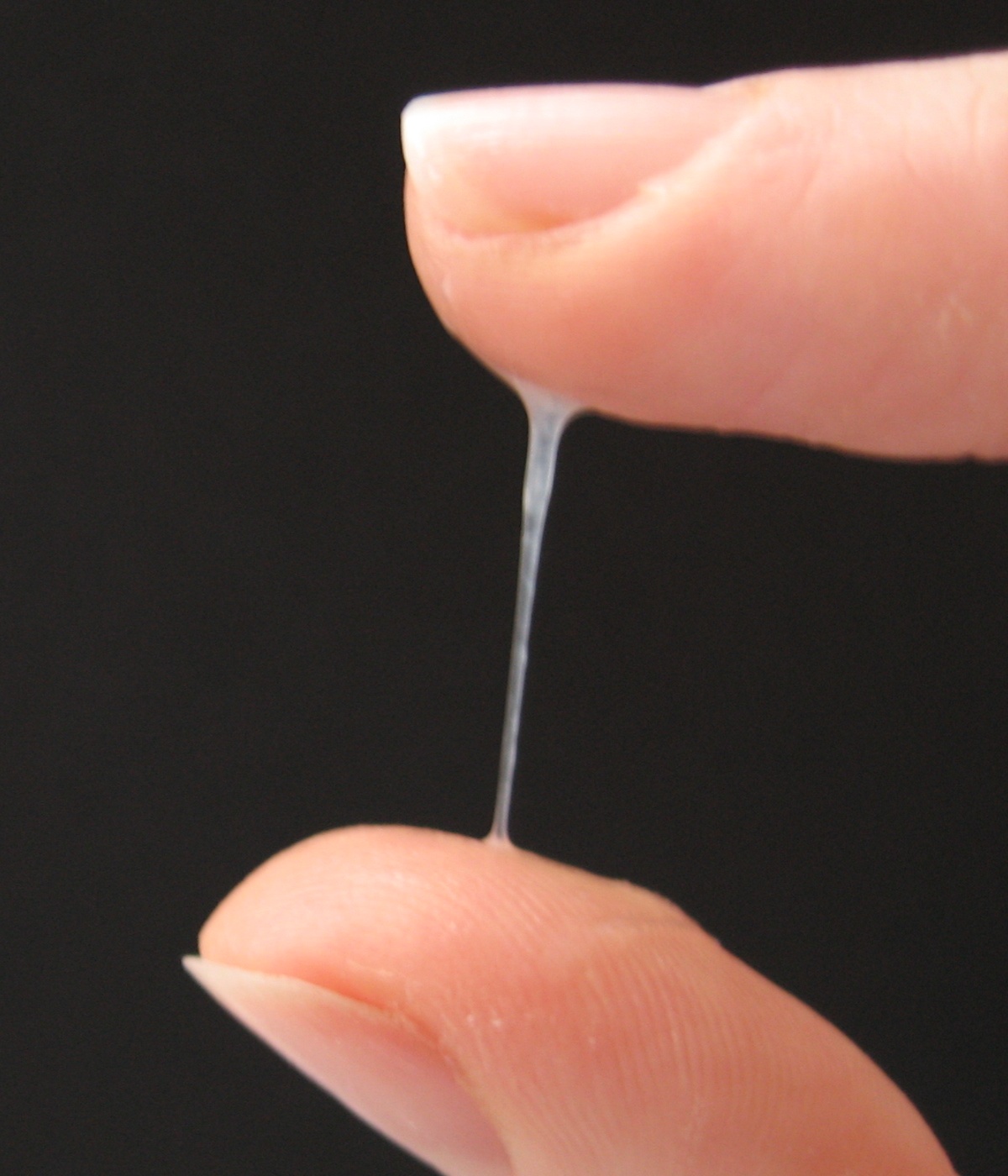The Fertility & Cervical Fluid Connection
One of the most important body signs to watch and observe for when you are trying to conceive is your cervical mucus, also called cervical fluid. Raise your hand if you were taught as a woman that it is not only natural for us to experience a change in cervical fluid throughout our cycle, but that it is also very normal. Yes, that’s right, if you are like me, no one told us this! In fact, no one even mentioned this hush hush subject.
And so, if you are also like me, you may have been surprised to learn that seeing cervical fluid being produced by your body can actually quite a positive thing. Most of us are vaguely more aware of our own cervical fluid during sex, as usually more of it is produced by the body allowing for more comfort. But that usually is it. We may have observed more or less of it at different points in our lives and wondered why (or maybe wondered if there was something going on wrong because of it).
Every young woman should be taught in school, or at the very least by their doctors, how their body works. The more we know about what is normal or possibly abnormally with our body’s signs and symptoms, the more empowered we are to make changes and get help when needed.
Observing cervical fluid throughout your cycle is your secret weapon when trying to conceive. Why? It helps you know when you are most fertile. More than your ovulation predictor kit and much more than just guessing when to have sex based on the number of days in your cycle.
Read on and I’ll tell you why. But first, let’s unwrap this subject just a bit more.
Just what is cervical fluid and why is it so important?
Cervical fluid (CF) is also be referred to as cervical mucus (CM). Either term can be used interchangeably, as that’s what it actually is, fluid or mucus produced by the glands of the cervix (which is the opening to the uterus).
The amount and consistency of this fluid varies, depending on where you are at in your menstrual cycle. The variation is triggered by the level of estrogen in your body. For example, just after your period ends, estrogen levels are at their lowest. At this time, you’ll see either no cervical fluid at all or thicker cervical fluid. This type of CF blocks sperm from entering the cervix as it is not a fertile time of the cycle yet.
On the other hand, as a woman approaches mid-cycle and her estrogen levels begin to peak, the high amounts of estrogen cause the cervix to produce a different type of cervical fluid. This CF is coined egg-white cervical fluid, as it literally looks like egg-whites - it is usually thin and can be stretched between two fingers. But the most important thing about this type of CF is that it helps the sperm swim. It provides a safe and alkaline environment for the sperm to reach the egg as quickly as possible.
Tracking Your Cervical Fluid & Fertility
Okay, so now we know the important role cervical fluid has in our bodies as women, but why track it throughout our cycle? Short answer, because it can literally double your chances of conceiving. Incredible, right?! In a 2013 article in the journal Fertility & Sterility, researchers found women who tracked their cervical fluid were over twice as likely to get pregnant over a 6 month period of time. Another previous study found women who timed intercourse to days when they had egg-white cervical fluid were found to have a 2-3 times more chance of becoming pregnant.
So why is this?
As I talked about earlier, cervical fluid is a sign of growing estrogen levels in the body. When estrogen peaks is when you usually will see the fertile type of cervical fluid, the egg-white stretchy kind. Once estrogen peaks, this signals to the brain to release luteinizing hormone (LH) in a surge. When you use an ovulation predictor kit (OPK), it is tracking this LH surge. The LH surge then causes the most mature follicle to burst and release an egg. And then once an egg is released, you have about 12-24 hours for it to be fertilized or it will dissolve.
Most women trying to conceive either use an ovulation predictor kit (which tracks that LH surge) or guess at when they believe they are ovulating (usually based on the number of days in their cycle) to help them pinpoint when to have intercourse.
There are reasons why both of these techniques used by themselves are not the most ideal. First, if you are waiting to have sex until you have a positive LH surge, you may be too late. Remember, you have just about 12-24 hours after that LH surge to have your egg fertilized. Depending on when you are testing for that LH surge and then having intercourse, this may be cutting that window of opportunity time really close or even too late.
On the other hand, if you are timing intercourse to when you believe you are ovulating, you may be missing the mark. Most women with regularly timed cycles (for example, every 30 days) do not ovulate on the same day every month. In fact, it is actually extremely rare to ovulate on the same day every month. In a majority of women, ovulation occurs within a narrow range of a few days. However, some women can ovulate over a much wider range of days.
Because of this, tracking your cervical fluid (either by itself or in addition to using an OPK) in order to time when your most fertile window occurs makes it more preferable to use as a fertility tracking method. By noting when egg-white cervical fluid occurs, you will be able to pinpoint when estrogen levels are peaking, and in doing so helping you time intercourse to the most fertile days in your cycle.
But what if you do not notice either egg-white cervical fluid or have thicker cervical fluid during ovulatory time?
What To Do If You Have Low or No Cervical Fluid
First thing to do is check out what medications you are using, as they may dry or decrease cervical fluid levels. These include:
Allergy medications, such as antihistamines
Cold and sinus medications (like Benadryl)
Cough suppressants
Atropine (used in many different medications for colds, eye issues, diarrhea, poisoning)
Propantheline (peptic ulcer)
Some anti-depressants
Clomid
Additionally sometimes vaginal infections or hormonal imbalances could be at the root of why you may not see cervical fluid. If the following recommendations do not work, I recommend getting support to balance your hormones with a natural fertility specialist.
If medications are not the issue, here are some additional tips to help improve cervical fluid:
Drink plenty of water daily. Cervical fluid is 90% water, so if you are dehydrated, your cervical fluid will dry up more easily as well.
Take 1-2,000mg of Evening Primrose Oil or Borage Oil (in the follicular phase only) (300-400mg of GLA daily ideally) - This supplement helps to thin cervical fluid and increase the amount of it.
Use sperm friendly lubricants during your fertile window period of time before ovulation. These lubricants mimic fertile cervical fluid consistency and pH level. The most popular on the market is Pre-Seed, however it contains harmful parabens. Instead, I recommend using Baby Dance by Fairhaven Health.
If your cervical fluid is too thick, try guaifenisen for a few days before ovulation (at the recommended daily dose) - this is the main ingredient in over the counter cough syrup like Robitussin.
Take an all in one enhancing cervical fluid supplement - one of my favorite supplements for increasing both cervical fluid and the uterine lining is Fertile CM by Fairhaven Health. It combines l-arginine (be cautious if you have herpes) and a proprietary blend of antioxidants.
Try various herbs: Shatavari root and Red Clover are two of my favorites.
There are also some other various home remedies which have been handed but don’t have research supporting them (yet): drink a glass of grapefruit juice daily the week before ovulation, eat a clove of raw garlic daily in the follicular phase, eat pineapple daily in the follicular phase, and eat more carrots throughout the cycle.
Are you a woman trying to get pregnant and looking for more personalized guidance and support into natural ways to increase your fertility? Book a FREE Fertility Audit call with a member of our team here.

